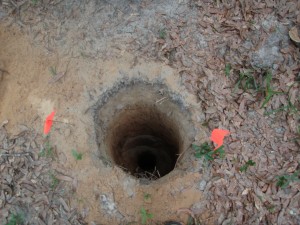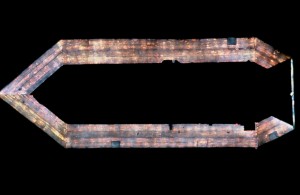What actually is archaeology? How is it useful to us? Archaeology isn’t the glamorous profession of finding gold and precious objects that many people believe it is. It also doesn’t involve excavating everywhere either. Archaeology can be conducted in many different ways other than excavation. Surveying the land is an important aspect to the archaeology process, through this process you detect and record any and all surface features on the land. By surveying the surface you can make conjectures about the subsurface features that could also be there.
Mapping and using gps is also important in real life archaeology. Unlike movies and other stereotype filed media, archaeologist don’t just stumble upon caves and marvelous ancient artifacts. They do extensive mapping and record keeping, in order to survey the land and find features that could hold keys to the past. Shovel test pits are used to locate artifacts as well as learn about the stratigraphy of the soil. This is also contrary to the idea of archeology brought about by movies and television.
There are also many ways of doing archaeology that you might not think of, just ask Joseph Zarzynski who is an underwater archaeologist. He did work in Lake George where he and his team uncovered a warship from the French and Indian war. They then turned the site into an underwater research park where scuba divers can come and observe the wreak and learn more about American history as well as archaeology. Many people wouldn’t believe this is a type of archaeology but then again many people don’t know what archaeology is. All of these techniques are useful and allow us to learn about our past to better our future.
Ashmore, Wendy, and Robert J. Sharer. Discovering Our Past: A Brief Introduction to Archaeology. New York: McGraw- Hill, 2012. Print.
image 1 url
image 2 url



Thanks to Indiana Jones, most people have a much more glamorous view of archaeology than the reality of our discipline. Mapping and GPS work is often a good chunk of archaeological practice, despite the public’s romantic view of excavation, because context, or the physical location of the artifact, is absolutely critical. Context, it is often said, is everything, and artifacts cannot be truly analyzed unless they are considered in relation to where it was found and the other objects surrounding it. Context becomes an interesting question when considering the underwater archaeology that you described; since most archaeologists work on land, underwater researchers need a whole new set of skills – how to date artifacts, for example, or how to remove them (or preserve them, if moving them is out of the question) once they’ve been discovered.
For those interested in underwater archaeology, check out the Museum of Underwater Archaeology’s website: http://www.uri.edu/mua/